

Updated December 16, 2024
Nearly half of employees under the age of 35 oppose their companies regulating if they can express political views on personal social media profiles at work, according to our survey of 500 employees in the U.S. Some employees want their company to regulate if they can discuss politics on personal social media profiles at work in order to preserve company culture.
In August 2017, Kenneth Story, a University of Tampa sociology professor, came under intense scrutiny for a tweet suggesting that the damage in Texas from Hurricane Harvey was retribution for the state’s support for the Republican party.
“I don’t believe in instant Karma but this kinda feels like it for Texas. Hopefully this will help them realize the GOP doesn’t care about them,” Story’s tweet read.
Looking for a Social Media Marketing agency?
Compare our list of top Social Media Marketing companies near you
The incident ultimately resulted in Story resigning, though the university decided not to fire him.
Story’s example raises questions about how political views on a personal social media account can impact an employee’s job standing.
For example:
Clutch surveyed 500 full-time employees to learn if employees expect to be allowed to discuss politics on their personal social media profiles when they are at work.
We found that employees are more wary about political expression on social media than with colleagues in their actual office space and some are open to a company policy regulating political discussion on social media to preserve company culture.
Younger generations of employees, though, are much more likely to view social media as separate from work and don’t want companies to regulate or monitor how they use it to express political views — even if they post while at the office.
Tweeting at work? Our new data finds that younger employees don’t want companies to interfere with their ability to discuss politics on personal social media profiles, even at work.
The 3rd and final part of Clutch's 2019 Political Expression in the Workplace survey is here!
Our survey of 500 full-time employees reviews employee expectations about how if their companies can and should regulate how they use social media to express their political views at work.
Social media has replaced the water cooler as the place to converse with coworkers. To preserve company culture, nearly 30% of employees are open to companies clarifying how they can use personal social media profiles to express political opinions while at work.
To avoid disrupting a company’s culture, many employees support their employer monitoring and regulating coworkers’ personal social media use at the office.
Twenty-nine percent (29%) of employees agree that their companies should clarify how they can express political views on social media at work.
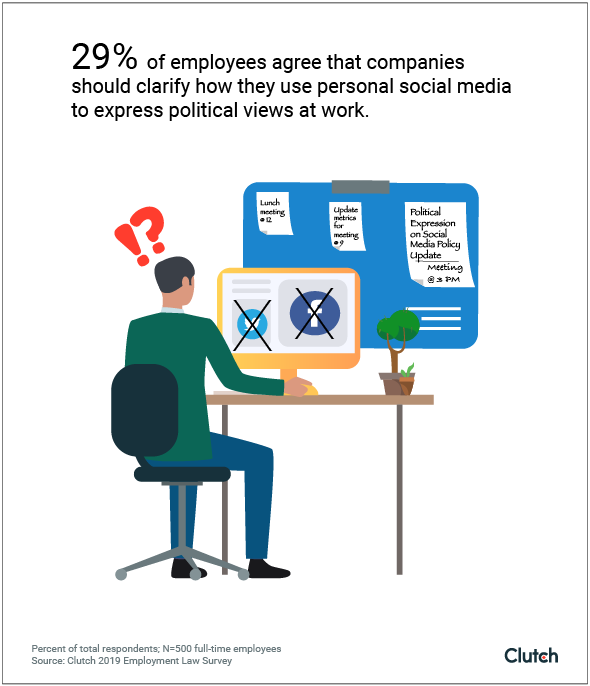
In comparison, only 27% of employees think their company should have a formal political expression policy that outlines what in-person political discussion is appropriate at work.
Social media is the new “water cooler” at work, or the primary area of social exchange among coworkers. Interactions among coworkers now often take place on company-controlled social platforms such as Slack or privately on Twitter or Facebook.
As such, employees’ interactions on social media, both positive and negative, contribute to the company’s overall culture.
Social media interactions often lack the social cues and emotions associated with in-person interactions, though. For example, employees may find it more difficult to “read a room” or show empathy when employees interact or express an opinion via social media.
“The problem with social media is that you don’t empathize with the situation others have as you would do when you are face-to-face,” said Miles Maftean, a content specialist for Zety, an online resume builder. “You’re able to detach more and label someone just because of their political beliefs without actually questioning them as to why they believe something in the first place.”
To avoid a company culture in which coworkers lack empathy for one another, employees may want their company to monitor and regulate how people use personal social media profiles to discuss politics while at work.
Employees can legally express political views about certain topics at work, though they risk consequences for expressing political views on social media at work about topics not covered by employment or labor laws.
Employees may feel that social media exists in a different “realm” than the physical office. This separation can make employees feel more comfortable expressing opinions on social media than they would in the office.
Legally, however, company limits about which political topics employees can discuss in the office also apply to social media.
Labor laws such as the National Labor Relations Act (NLRA) outline political topics that employees are allowed to discuss. These include issues that relate directly to their experience at work, such as wages or collective bargaining.
Anti-discrimination employment laws also dictate the political speech employees can’t discuss, such as language meant to harass or discriminate.
Tony Arevalo founded Carsurance, an online car insurance reviews platform. He draws a sharp distinction between expressing political opinions in the office and on personal social media channels.
Arevalo believes employees have the right to express their opinions on personal social media profiles.
“I think that using personal accounts for sharing political opinions is a part of freedom of speech and shouldn’t be regulated by companies,” Arevalo said.
"Using personal accounts for sharing political opinions is a part of freedom of speech and shouldn’t be regulated by companies." – Tony Arevalo, Carsurence
In fact, employees do not have total freedom of speech at work, particularly in the private sector.
When employees express political views on social media during work that are not covered by employment or labor laws, they can face consequences from their employer.
The story of how Jim Owens lost his job as a construction administrator illustrates the risk employees take by expressing political views at work on social media.
In 2014, Owens was fired from his job at ADC Engineering in Charleston, S.C. for leading an opposition movement against a project that his company was hired to complete.
His termination was upheld in court because he used a company computer to access social media during work hours.
Employees have the same legal right to express political opinions on social media as in the office, which limits the topics they can discuss without consequence from an employer.
Employment and labor law protections often are outlined in a company’s political expression policy. In many cases, the limits of political expression on social media often are the same as they are in the office.
Often, companies outline how they comply with employment and labor laws through a political expression policy. Experts recommend companies include social media protocols in this policy.
Jerry Oppel specializes in employment law in the Baltimore office of Baker Donelson, a national law firm. He suggests that companies clarify how employees can use social media at work to discuss political topics as part of a political expression policy.
“The question about social media for political expression at work is a real minefield,” Oppel said. “Employers should have a political expression policy that includes how employees can use the company’s internet or any of their [social media profiles] for political expression.”
“The question about social media for political expression at work is a real minefield." – Jerry Oppel, Baker Donelson
More than one-third of companies (36%) have a political expression policy in place, according to employees.
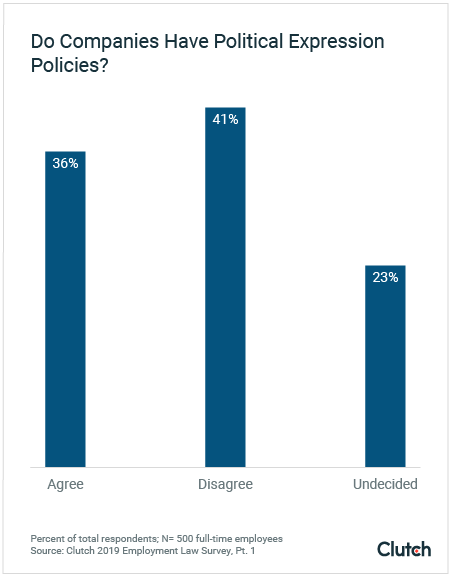
Over 40% of companies don't have a political expression policy in place. Employees at these companies may not know if they can discuss politics on personal social media profiles at work.
To provide clarity, some employees prefer banning social media altogether.
Melanie Musson is a writer for EffortlessInsurance, an online insurance brokerage. She suggests that companies adopt an absolute policy that either allows total freedom or fully restricts for employees to discuss any topic on personal social media profiles at work.
"I think a company should either allow all social media discussions or ban social media during working hours altogether," Musson said.
When companies adopt a social media policy or include social media in their political expression policy, they can clarify how employees can use their personal profiles to express political views at work. To clarify the legality of their policies, businesses can seek the services of a labor and employment law firm.
Nearly half of employees below the age of 35 (45%) are opposed to companies regulating how they discuss politics on social media at work, a product of their experience in the digital age and expectations about work-life balance.
Younger employees consider social media as wholly separate from their work, regardless of if they use it during work or identify themselves on social media as affiliated with a company.
Nearly half of employees (45%) ages 18–34 disagree that their companies should clarify how employees can use social media for political expression while at work.
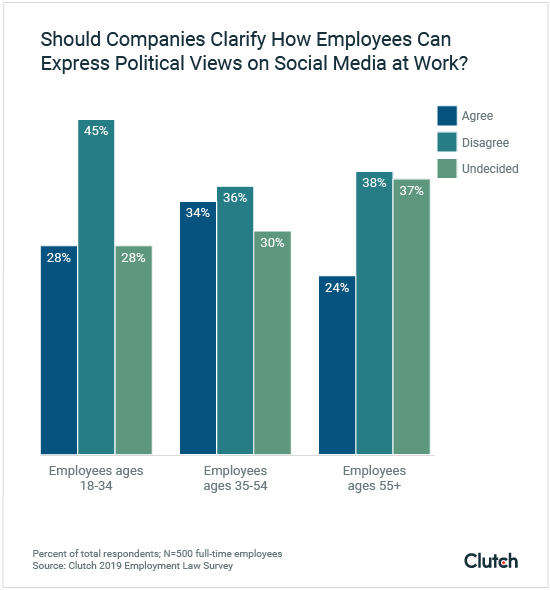
Employees over the age of 35 are more likely to support a company policy that clarifies how they can use social media to discuss politics at work.
There are two main reasons why younger employees may be more skeptical of companies regulating political views on personal social media profiles:
People ages 18–34 use social media more than older age groups. As a result, companies policies that deal with social media may impact them more as a group.
According to Pew Research Center, 86% of millennials (ages 23-38) use social media, which is over 30% more than the number of people in older generations who use social media.
Younger generations often feel more comfortable with social media interactions and expressing themselves on social media than in person.
When a company limits how younger employees use their personal social media profiles to express political views, it may create an environment in which younger employees feel less comfortable in the workplace.
Younger employees want a clear distinction between their work and personal lives. Companies cross the divide between the office and employees’ personal lives when they regulate how employees can use social media to express political views.
Stacy Caprio is the founder of Accelerated Growth Marketing, an SEO company in Chicago. She views her employees’ social media profiles as extensions of their lives outside of work.
“Companies should not be connected to employees on their personal social accounts,” Caprio said. “Separating work and personal life is beneficial on both sides because it allows employees to relax and recharge in their personal life instead of always being on guard.”
The distinction between an employee's life at work and outside of the office gets blurred, however, when they mention their company on personal social media profiles.
For example, it's common for people to include a reference or even explicitly link to a company in the bio section of their Twitter profile.

When an employee affixes their company to their personal social media, they may be viewed as a representative of the company, even if they are outside of the office or speaking of their own accord.
To Arevalo, when employees voluntarily associate themselves with a company on personal social media accounts, it gives their company leeway to monitor and regulate their profile.
“I think that companies do keep the right to enforce not discussing politics in case an employee identifies publicly with the company,” Arevalo said. “Their followers may see them as representatives of the company, in which case it is not acceptable to share political opinions.”
When employees act as a representative of a company on their social media profiles, they may fall under the same regulations that apply in the office, which limits what topics are considered acceptable political discussion.
More younger employees think it’s important to work at a company that shares their political views. Employees may think that social media policies are unnecessary to preserve company culture when they share similar political perspectives.
When coworkers share political views, they may see no reason why their companies need to police employees expressing those views on social media.
Younger employees are much more likely to want to work at a company that shares their political views than older generations, which helps explain why they are more hesitant about companies regulating personal social media use.
More than one-third of employees ages 18–34 (36%) agree that it’s important to work for a company with political views that align with their own. Only 20% of employees ages 35 and older agree that it’s important.
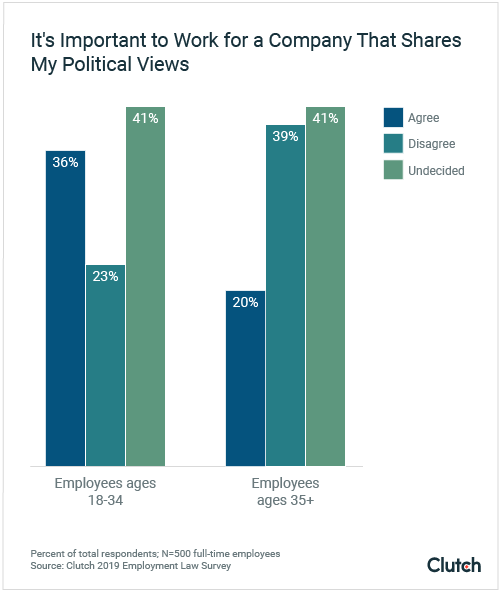
Caprio says when coworkers are like-minded or friendly, discussing politics on social media or in the office is the same as discussing with your friends.
“If you are friends with everyone in your office on social media, discussing politics on social media is the exact same thing [as discussing them in the office],” Caprio said. “If you are not social media friends with your co-workers, then it is completely different.”
When employees work around like-minded colleagues they consider friends, they can be more comfortable using social media as a platform to discuss and share political views.
Younger employees are more likely to value and seek out like-minded workplaces. As a result, they are less likely to think their company needs to enforce a social media policy to maintain a positive company culture.
When employees are already subject to a political expression policy at work, they are more likely to support social media regulations to ensure they comply with their company’s policy.
When a company has a political expression policy, its employees are more likely to want clarity about company rules regarding discussing politics on their social media profiles while at work.
About half of employees at companies that have a political expression policy (44%) think their employers should clarify how employees can express political views on social media.
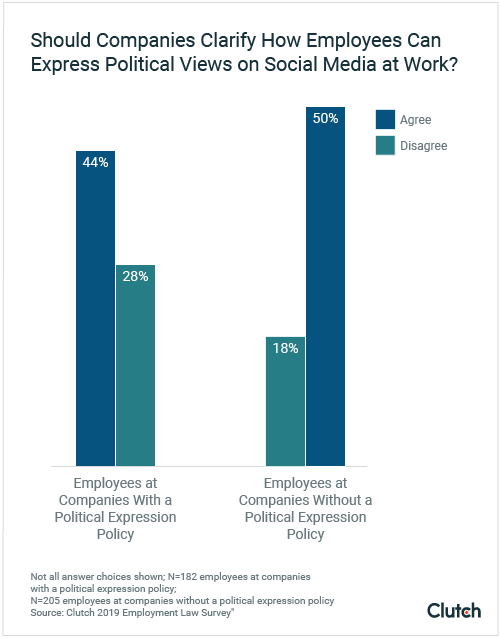
Only 18% of employees at companies without a political expression policy support their company regulating if they can discuss politics on social media.
According to Caprio, this data indicates that political expression policies are necessary for two reasons:
“The pro [of a social media policy] is that people aren’t shoving their views in others’ faces,” Caprio said. “I think employees agreeing that companies with policies should regulate employee personal social media accounts doesn’t mean that policies are effective but simply that policies are necessary.”
When a company already has a political expression policy in place, its employees are more likely to want clarity on if they are allowed to express their political views on social media at work. This way, they can know if discussing political views on social media puts them at risk of violating their company’s policy.
Most employees do not want their company to police how they talk about politics at work. Only 27% of employees think their companies should have a political expression policy.
More employees, though, support their company regulating if they can express political views on social media at work than support their company having a formal political expression policy.
The same legal standards apply to both discussing politics on social media at work and discussing politics in the office. Some employees view them as distinct, though.
Younger employees don’t think their companies should clarify if they can share political views on social media at work, which reflects differing expectations about the workplace among age groups. Younger employees also rely on social media more often to communicate and view personal social media profiles as separate from work, even if they are posting on social media during work hours.
Employees at companies with a political expression policy are more likely to support employers clarifying how employees can express political views on social media, suggesting that these policies are a necessary element of their company’s culture.
Clutch surveyed 500 full-time employees in the U.S. to learn their opinions about expressing political views on social media at work.
Twenty-seven percent (27%) are ages 18-34; 37% are ages 35-54; and 36% are ages 55 and above.
Respondents also identify their political leanings across the political spectrum: 34% describe their political attitudes as somewhat or very conservative; 25% describe themselves as somewhat or very liberal; 21% describe themselves as moderate; and 13% describe themselves as apolitical.


